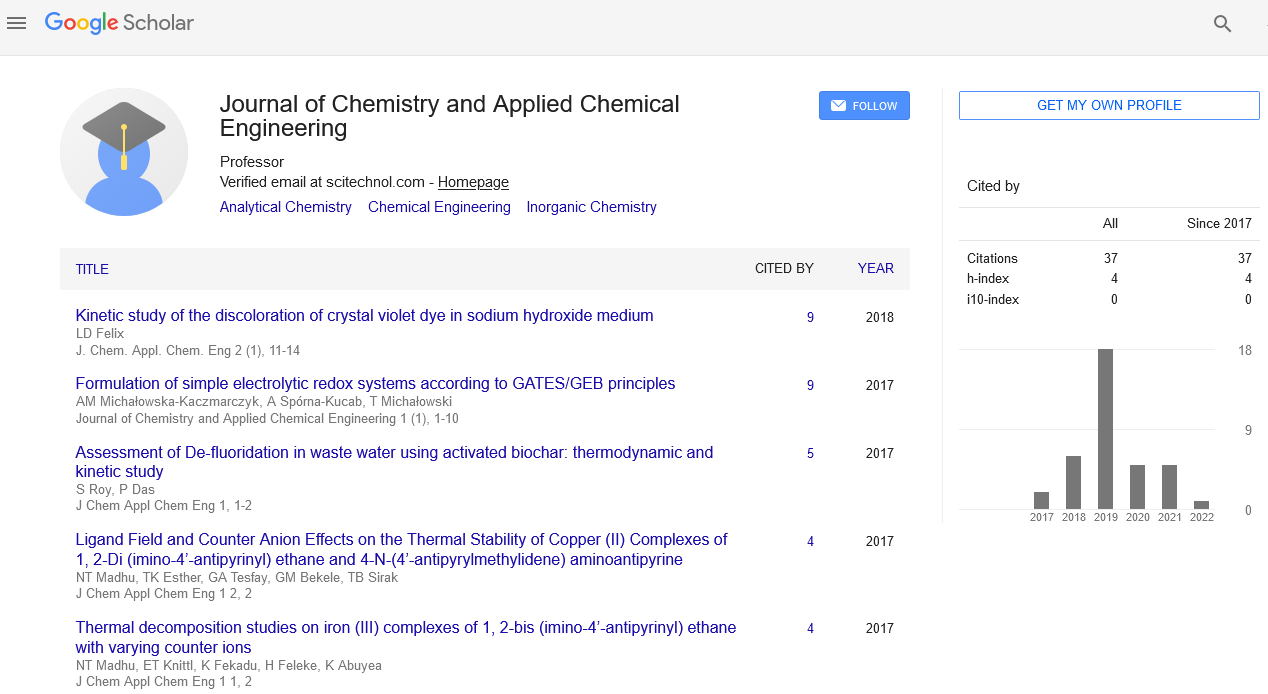Nano-approach in articular cartilage tissue regeneration
Laila Mahmoud Montaser
Menoufia University, Egypt
: J Chem Appl Chem Eng
Abstract
Statement of the Problem: Articular cartilage injuries can occur as a result of either traumatic or progressive degeneration (wear and tear). Articular cartilage has no direct blood supply, thus it has little or no capacity to repair itself. Cartilage has a limited regenerative capacity. Faced with the clinical challenge of reconstruction of cartilage defects, the field of cartilage engineering has evolved. Therefore, tissue engineering which aims to create novel and improved tissue substitutes has evoked increasing interest for cartilage repair. Although stem cells hold great potential for the treatment of many injuries and degenerative diseases, several obstacles must be overcome before their therapeutic application can be realized. These include the development of innovative methods to track and guide transplanted stem cells. The purpose of this study is presenting emergent approach in the field of articular cartilage tissue engineering with applying Nano scaffolds for specific application. Methodology & Theoretical Orientation: A definite need exists for functional techniques to stimulate regeneration and provide a replacement for the damaged cartilage. Before transplantation, mesenchymal stem cells (MSCs) are generally seeded on Nano scaffolds that recapitulate the extracellular matrix and provide cells with information that is important for tissue development. Accordingly, innovative tissue engineering approaches to induce and enhance cartilage regeneration are being applied. Findings: Growth and differentiation of MSCs in Nano scaffolds is very dynamic to develop cartilage tissue. Conclusion & Significance: The combinations of nanotechnology and stem cell therapy, allowing engineering of Nano scaffolds with various countenances to realize important improvements. The implementation of Nano scaffolds to stem cell-based therapy would be able to address the challenges of the failure of injected MSCs to engraft to target tissues. Recommendations are made for the evolution of future clinical innovative strategies applying MSCs in Nano scaffolds, could improve the quality of new developed cartilage.
Biography
Laila Mahmoud Montaser, MD is professor of clinical pathology. She is chair, of Stem Cell, Regenerative Medicine, Nanotechnology and Tissue Engineering (SRNT) Research Group. She serves as the head, founder of Clinical Pathology Department, Faculty of Medicine, Menoufia University, Egypt. She is the nominator of Council of Menoufia University to TWAS prize in Medical Sciences and to award of nano science research excellence. She gained 4 Awards: - Gold Medal of perfect and certificate of excellence for the best pupil in Alexandria Governorate from Egyptian Feast of Science. - Medal of Merit from Egyptian Medical Syndicate in 1986, 1998, and 2002. She supervised more than 60 M. Sc. theses and 15 doctorate theses. She has made Faculty of Medicine a hub at Menoufia University. She is uniquely trained and situated and has a philosophy on how to manage research specifically with Stem Cell, Regenerative Medicine, Nanotechnology and Tissue Engineering.
E-mail: lailamontaser@gmail.com
 Spanish
Spanish  Chinese
Chinese  Russian
Russian  German
German  French
French  Japanese
Japanese  Portuguese
Portuguese  Hindi
Hindi 